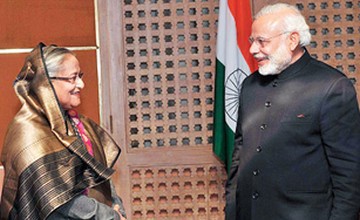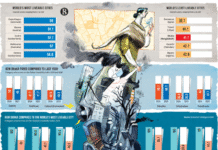The next step in the global odyssey that has had Mr. Modi circulating around the world is now in process with his visit to Bangladesh. Unlike one or two of the others, this visit will take the PM to a core area of Indian concern. Bangladesh is one of the closest neighbours, partner in peace and war, cultural and economic twin, and there is no escape for either of the two from the close embrace that holds them together.
Yet, as is not unusual in relationships of such ineluctable closeness, while there is genuine warmth and friendship between them there is also plenty of scope for misunderstanding, and India and Bangladesh have had their full share of that. At one stage, security issues overshadowed ties owing to the activity of extremist groups but that menace has been contained and relations are friendly and constructive, but still there are other issues to be sorted out, such as unrecorded migration across the border, which remains porous despite every effort to seal it off, a persistent trade imbalance, and problems of mutual access, among others. Most irksome, and the source of much misunderstanding, is the sharing of the many rivers that flow from one country to the other, where India as the upper riparian has to be careful not to do anything that can create misunderstanding downstream. New Delhi also has constantly to bear in mind the views of West Bengal, as was demonstrated when Dr. Manmohan Singh had to retreat at the last minute from a sharing agreement on the river Teesta because of the demurral of the Chief Minister of West Bengal.
So there are several issues to be considered as the Prime Minister sets out for Dhaka, some of them contentious, most of them with a considerable history. What has been identified as the current prime concern is the finalization of the Land Boundary Agreement (LBA) between the two countries. This is a highly desirable and long-pending agreement to remove the numerous anomalies that were inherited from earlier days, when the boundary was an administrative line, not an international border. Left over from those times, each side has enclaves of its territory embedded in the other, and to take the obvious step of ironing out differences by exchanging enclaves has proved impossible until now, for a series of political and legal reasons.
Now if Mr. Modi, with the rare parliamentary strength he enjoys, goes ahead with doing what has often been mooted but not until now completed, it will indeed be a major step forward. He is to be accompanied by the Chief Minister, which is a good augury given the past differences between Centre and State on the issue, and the PM’s personal engagement would mean that his party’s long-term opposition to the LBA no longer applies. This is a welcome development and would place a legitimate seal of achievement on the visit. Any decision affecting the territorial shape of the country has constitutional implications and requires parliamentary approval, so it is not an altogether simple process even if it commands general acceptance across the political spectrum, but the preliminary groundwork has been done and the stage set for the LBA to be agreed during the Dhaka visit.
It should not be supposed, however, that the LBA by itself would take the relationship to a new level of mutual understanding. There have been quite a few false dawns in India-Bangladesh relations, and what is being heard today about the LBA is reminiscent of the discourse that preceded the Farakka agreement, when it was supposed that the two countries were on the verge of a different order of relations and all remaining issues would be readily resolved after the overarching matter of Farakka had been satisfactorily dealt with.
Of course, that is not what happened: differences on the Teesta soon came to replace earlier concerns about the Ganga, and matters of abiding concern to India like transit for its goods across Bangladesh territory, went to the back burner. It became evident that each of the outstanding issues would have to be treated on its merits, and goodwill generated by one agreement did not automatically lead to the resolution of the next one. It is thus conceivable that even if agreement on the land boundary is achieved as a result of Mr. Modi’s visit it may not unlock the way to other agreements that have been discussed and debated for many years.
Among these the matter of transit has obvious salience. The land route to India’s North-East is a tortuous one around Bangladesh, slow and expensive. The riverine route, once the major means of transporting bulk goods like tea, is still in use but has decayed and lost a good part of its utility. Revival is certainly possible, and restored riverine and rail transit would serve India well. No doubt this issue will feature in Mr. Modi’s agenda, for it is one of the hardy annuals of India-Bangladesh talks and both sides are well aware that there is real mutual benefit to be had through shared transit facilities but until now the kind of progress required has not been possible.
This particular issue has acquired a further dimension ever since India started to Look East, for opening land access to that region requires improved communications by road and rail, long envisaged but until now largely on the drawing board. With the emergence of new financing organisations, in which China has a major role, development of infrastructure throughout Asia is set to receive a big boost and some of the long-pending projects now have a better chance of being realized.
Transit is only one of the issues that demand attention. Bangladesh does not look like a natural partner for Mr. Modi’s ‘Make in India’ strategy, being itself in search of partners for its manufacturing plans, but there is room for greatly enlarged economic activity between the two neighbours. India has been keen on buying natural gas from Bangladesh but that has not worked out so far as the neighbour felt it did not have enough to spare. Even so, there is room for much closer economic association between the two countries and many grandiose schemes to this effect have been envisaged.
Such schemes can only flourish in an atmosphere of mutual confidence and cooperation. The two PMs have already done much to bring this about and no doubt Mr. Modi’s visit will be an important step in the process. His decision to go to Dhaka shows the political will necessary to take matters forward, and Sheikh Hasina’s track record shows her firm commitment in the same direction.
Source: The Statesman











A clear indication that Modi is coming to extend India’s interests in Bangladesh and in the process bolster Hasina’s (their agent in Bangladesh)grip on power.
This is what we all have guessed right from the time Modi came to power and lately, his plan to visit Bangladesh. Some fools especially in the ranks of BNP thought that change of government in India from Congress to BJP will change fortunes of their party.
Things do not change that easily in India given that its bureaucracy (South Block) and itsintelligence agencies (RAW) decide things especially in foreign relations and these are the people that have put Hasina in power in Bangladesh in the first place, for a purpose and they are still around.
Politicians only make noises and since getting elected and assuming the position of the Prime Minister of India Modi has been making noises the loudest of all with little or no tangible result.
Forget about change of policy for Bangladesh, even in India itself almost in every front Modi has failed to make any dent.
Therefore, my take on Modi’s visit is this that he coming to extract more concessions from Bangladesh in exchange of guarantee of Hasin’s continuation in power and not to promote good governance.
In these circumstances my advise to BNP is this that stop licking the arse of Modi. He will not take you to power. Stick to your true nationalist policies (not Islamist fundamentalist but inclusive nationalist) and boldly criticize India/Hasina Government where these are due. This way, you may not come to power that soon, but at least you will remain relevant and be part of the masses who eventually may/would bring you to power (as they did in 1990), if need be through mass movement! Otherwise, you will disappear or become irrelevant like the Jatyo Party.
Finally, here is a rule of thumb – a tormentor can never be the mentor!!.